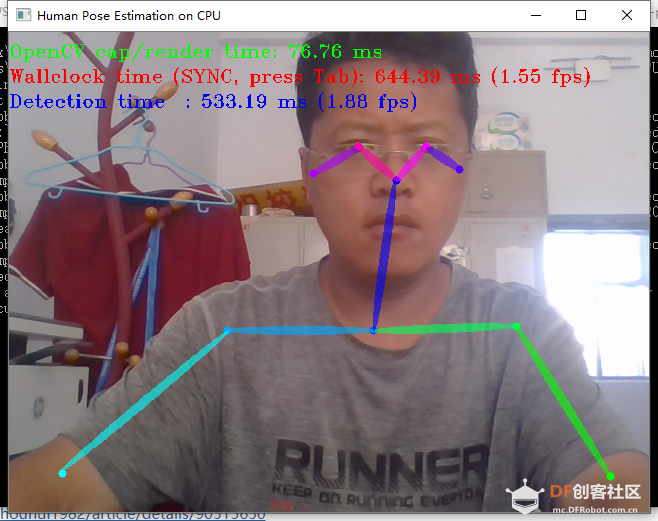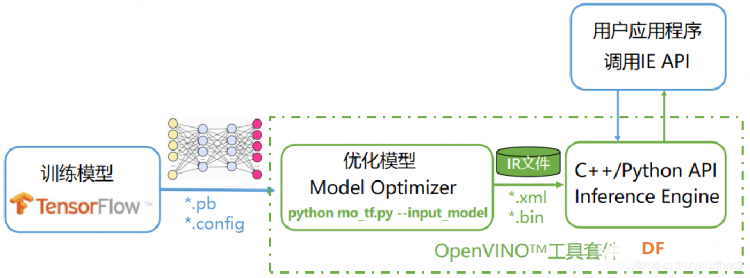|
7720| 6
|
[平台测评] 【天天向上】OpenVINO学习笔记(一) |

|
【天天向上】OpenVINO学习笔记(三)使用 OpenVINO 的 OpenCV 库 【天天向上】OpenVINO学习笔记(二)运行python demo 【天天向上】OpenVINO学习笔记(四)目标检测模型 【天天向上】OpenVINO学习笔记(五)驾驶室内监控 【天天向上】OpenVINO学习笔记(六)Smart Classroom C++ Demo 【天天向上】OpenVINO学习笔记(七)C++ 演示 【天天向上】OpenVINO学习笔记(八)凝视估计演示 【天天向上】OpenVINO学习笔记(九)3d人体姿态估计测试 【天天向上】OpenVINO学习笔记(十)人脸识别+监控+计算棒 【天天向上】OpenVINO学习笔记(十一)网络摄像头使用 【天天向上】OpenVINO学习笔记(十二)测试真实环境识别效果 【运行范例】 OpenVINO范例-人体姿态分析  【演示视频-姿态识别】 (interactive_face_detection_demo.exe -i cam -m C:\Users\hp\Documents\Intel\intel\face-detection-0100\FP16-INT8\face-detection-0100.xml -d CPU) 【OpenVINO工具套件】 OpenVINO工具套件全称是Open Visual Inference & Neural Network Optimization,是Intel于2018年发布的,开源、商用免费、主要应用于计算机视觉、实现神经网络模型优化和推理计算(Inference)加速的软件工具套件。由于其商用免费,且可以把深度学习模型部署在英尔特CPU和集成GPU上,大大节约了显卡费用,所以越来越多的深度学习应用都使用OpenVINO工具套件做深度学习模型部署。 它支持tensorflow caffe mxnet等模型的转换,将这些模型的权重与网络结构转换成 .xml 与 .bin文件,它好比计算机语言编译器可以将多种语言编译成二进制代码。避免了开发人员为了同一个业务需求,在不同平台多次开发,多次部署,使用openvino,只需一次开发,就可以将模型部署在多个平台。openvino支持多种基础网络,多种目标检测算法,多种图像分割算法,支持rcnn,支持权重量化操作。 OpenVINO工具套件主要包括: Model Optimizer(模型优化器):用于优化神经网络模型的工具 Inference Engine(推理引擎):用于加速推理计算的软件包 通常一个完整的深度学习应用开发流程可以归结为三步: 用TensorFlow训练模型 用OpenVINO模型优化器优化模型 用OpenVINO推理引擎API开发用户应用程序  1、OpenVINO范例-超分辨率(super_resolution_demo) 2、OpenVINO范例-道路分割(segmentation_demo) 3、OpenVINO范例-汽车识别(security_barrier_camera_demo) 4、OpenVINO范例-人脸识别(interactive_face_detection_demo) 5、OpenVINO范例-人体姿态分析(human_pose_estimation_demo) 6、OpenVINO范例-行人车辆分析(pedestrian_tracker_demo)
【计算棒】 计算棒需要配合Intel出的OpenVINO推理框架,使用时首先需要将模型文件转换为OpenVINO的模型。OpenVINO目前支持Caffe、TensorFlow、MXNet等主流的深度学习框架。模型可以直接通过OpenVINO的转换工具进行转换。转换时需要输入网络输入节点的名称以及输入图片的大小,还有一点需要注意,NCS 2计算棒支持的是16位精度的浮点型数据,所以在转换时还需要加上”–data_type=FP16”。 OpenVINO框架中使用NCS 2计算棒和直接使用CPU性能差不多,使用CPU(Intel Core i5 4200M)时,检测一帧需要660ms,使用NCS2计算棒需要590ms。但是在 OpenVINO框架中使用CPU速度要比在MXNet中使用CPU快,MXNet中使用CPU检测一帧需要1.1s左右。OpenVINO前向计算能基本比mxnet框架快一倍。 【参考文档】 1、安装OpenVINO https://www.pianshen.com/article/6673625017/ https://blog.csdn.net/qq_36556893/article/details/81391468 2、OpenVINO 学习笔记(3):执行 OpenVINO Demos https://blog.csdn.net/u011385476/article/details/104769250 (1)”3.2 下载模型文件“中修改:python C:\IntelSWTools\openvino_2020.1.033\deployment_tools\tools\model_downloader\downloader.py --name human-pose-estimation-0001 为:C:\Program Files (x86)\IntelSWTools\openvino_2020.2.117\deployment_tools\tools\model_downloader>python downloader.py --name human-pose-estimation-0001 --output_dir C:\Users\zlzx\Documents\Intel 目录指定为自己的。 (2)"4、执行 human_pose_estimation_demo.exe"中修改human_pose_estimation_demo.exe -i C:\Users\LWL\Desktop\sample-videos-master\classroom.mp4 -m C:\Users\LWL\Desktop\human-pose-estimation-0001.xml -d CPU为:human_pose_estimation_demo.exe -i cam -m C:\Users\zlzx\Documents\Intel\intel\human-pose-estimation-0001\FP32\human-pose-estimation-0001.xml -d CPU 3、openVINO downloader.py下载全部模型命令 https://blog.csdn.net/zhouhui1982/article/details/90515650 4、使用CMD,由于目录比较长,可在文件夹内新建run.bat,内容为cmd.exe。双击运行。 5、OpenVINO Pre-Trained 预训练模型介绍 http://www.person168.com/?p=16701 |
|
import cv2 as cv # Load the model net = cv.dnn.readNet('face-detection-adas-0001.xml', 'face-detection-adas-0001.bin') # Specify target device net.setPreferableTarget(cv.dnn.DNN_TARGET_MYRIAD) # Read an image frame = cv.imread('/path/to/image') # Prepare input blob and perform an inference blob = cv.dnn.blobFromImage(frame, size=(672, 384), ddepth=cv.CV_8U) net.setInput(blob) out = net.forward() # Draw detected faces on the frame for detection in out.reshape(-1, 7): confidence = float(detection[2]) xmin = int(detection[3] * frame.shape[1]) ymin = int(detection[4] * frame.shape[0]) xmax = int(detection[5] * frame.shape[1]) ymax = int(detection[6] * frame.shape[0]) if confidence > 0.5: cv.rectangle(frame, (xmin, ymin), (xmax, ymax), color=(0, 255, 0)) # Save the frame to an image file cv.imwrite('out.png', frame) |
|
import cv2 as cv # Load the model net = cv.dnn.readNet('face-detection-adas-0001.xml', 'face-detection-adas-0001.bin') # Specify target device net.setPreferableTarget(cv.dnn.DNN_TARGET_MYRIAD) # Read an image camera = cv2.VideoCapture("rtsp://admin:HikCUALGW@192.168.31.241:554/Streaming/Channels/101") # Prepare input blob and perform an inference while True: text = "Unoccupied" # 获取当前帧并初始化occupied/unoccupied文本 (grabbed, frame) = camera.read() # 如果不能抓取到一帧,说明我们到了视频的结尾 if not grabbed: break frame = imutils.resize(frame, width=800) blob = cv.dnn.blobFromImage(frame, size=(672, 384), ddepth=cv.CV_8U) net.setInput(blob) out = net.forward() # Draw detected faces on the frame for detection in out.reshape(-1, 7): confidence = float(detection[2]) xmin = int(detection[3] * frame.shape[1]) ymin = int(detection[4] * frame.shape[0]) xmax = int(detection[5] * frame.shape[1]) ymax = int(detection[6] * frame.shape[0]) if confidence > 0.5: cv.rectangle(frame, (xmin, ymin), (xmax, ymax), color=(0, 255, 0)) cv2.imshow("contours", frame) key = cv2.waitKey(1) & 0xFF # 如果q键被按下,跳出循环 if key == ord("q"): break # 清理摄像机资源并关闭打开的窗口 camera.release() cv2.destroyAllWindows() |
|
FAILED: octave-resnet-50-0.125 octave-resnet-200-0.125 resnet-50 handwritten-score-recognition-0003 inception-resnet-v2-tf squeezenet1.1-caffe2 head-pose-estimation-adas-0001 vgg19-caffe2 gmcnn-places2-tf octave-resnext-50-0.25 yolo-v1-tiny-tf mobilenet-ssd densenet-169-tf faster_rcnn_inception_v2_coco ssd_mobilenet_v1_coco se-resnext-50 ssd_mobilenet_v1_fpn_coco ssdlite_mobilenet_v2 squeezenet1.1 vgg19 mobilenet-v2-1.4-224 mask_rcnn_resnet101_atrous_coco resnet-152 license-plate-recognition-barrier-0007 mobilenet-v1-0.50-160 efficientnet-b0 densenet-169 googlenet-v1-tf ssd_mobilenet_v2_coco resnet-18-pytorch colorization-v2-norebal ctpn mobilenet-v2 midasnet googlenet-v1 ssd512 octave-resnext-101-0.25 faster_rcnn_inception_resnet_v2_atrous_coco icnet-camvid-ava-sparse-30-0001 densenet-161 mobilenet-v1-1.0-224-tf efficientnet-b0_auto_aug mask_rcnn_inception_v2_coco googlenet-v4-tf facenet-20180408-102900 ssd300 yolo-v2-tiny-tf faster-rcnn-resnet101-coco-sparse-60-0001 densenet-201 mobilenet-v1-0.25-128 mobilenet-v1-0.50-224 single-human-pose-estimation-0001 densenet-121 efficientnet-b7_auto_aug Sphereface vgg16 octave-densenet-121-0.125 face-recognition-resnet50-arcface efficientnet-b7-pytorch se-resnet-152 human-pose-estimation-3d-0001 mtcnn-r densenet-121-caffe2 brain-tumor-segmentation-0001 face-detection-retail-0044 mask_rcnn_inception_resnet_v2_atrous_coco efficientnet-b5-pytorch resnet-50-pytorch densenet-161-tf se-resnet-101 densenet-121-tf octave-resnet-26-0.25 deeplabv3 resnet-50-caffe2 se-inception human-pose-estimation-0001 squeezenet1.0 mobilenet-v2-pytorch alexnet icnet-camvid-ava-0001 brain-tumor-segmentation-0002 mask_rcnn_resnet50_atrous_coco rfcn-resnet101-coco-tf face-recognition-mobilefacenet-arcface efficientnet-b5 octave-resnet-101-0.125 ctdet_coco_dlav0_384 se-resnet-50 se-resnext-101 yolo-v3-tf googlenet-v3-pytorch mtcnn-p resnet-50-tf caffenet efficientnet-b0-pytorch googlenet-v2 mobilenet-v1-1.0-224 faster_rcnn_resnet101_coco mobilenet-v2-1.0-224 ctdet_coco_dlav0_512 googlenet-v3 colorization-v2 face-recognition-resnet100-arcface i3d-rgb-tf octave-se-resnet-50-0.125 yolo-v2-tf mtcnn-o faster_rcnn_resnet50_coco vehicle-license-plate-detection-barrier-0123 resnet-101 face-recognition-resnet34-arcface |
|
python ./face_recognition_demo.py -m_fd C:\Users\hp\Documents\Intel\intel\face-detection-retail-0004\FP32\face-detection-retail-0004.xml -m_lm C:\Users\hp\Documents\Intel\intel\landmarks-regression-retail-0009\FP32\landmarks-regression-retail-0009.xml -m_reid C:\Users\hp\Documents\Intel\intel\face-reidentification-retail-0095\FP32\face-reidentification-retail-0095.xml -fg "D:/face_gallery" |
 沪公网安备31011502402448
沪公网安备31011502402448© 2013-2026 Comsenz Inc. Powered by Discuz! X3.4 Licensed